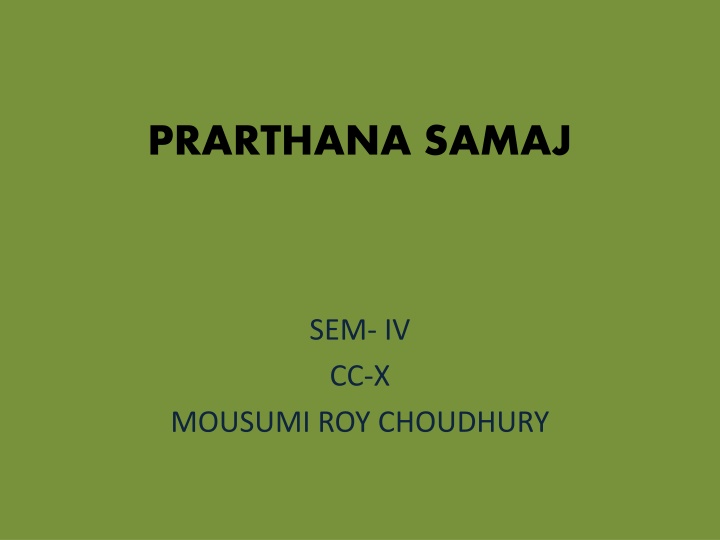Prarthana Samaj
Prarthana Samaj, meaning "Prayer Society" in Sanskrit, was founded in 1867 by Atmaram Pandurang with the objective of promoting belief in one God and advocating worship of the same. The movement gained traction when Mahadev Govind Ranade joined, with intellectuals advocating social system reforms. It was likened to the Brahmo Samaj movement and extended to South India by reformer Viresalingam. Mahadev Govind Ranade, a prominent figure in the movement, was known for his calm and patient approach towards social and religious reforms in India.
Download Presentation

Please find below an Image/Link to download the presentation.
The content on the website is provided AS IS for your information and personal use only. It may not be sold, licensed, or shared on other websites without obtaining consent from the author.If you encounter any issues during the download, it is possible that the publisher has removed the file from their server.
You are allowed to download the files provided on this website for personal or commercial use, subject to the condition that they are used lawfully. All files are the property of their respective owners.
The content on the website is provided AS IS for your information and personal use only. It may not be sold, licensed, or shared on other websites without obtaining consent from the author.
E N D
Presentation Transcript
PRARTHANA SAMAJ SEM- IV CC-X MOUSUMI ROY CHOUDHURY
Prarthana Samaj, or "Prayer Society" in Sanskrit, was a movement for religious and social reform in Bombay based on earlier reform movements. Prarthana Samaj was founded by Atmaram Pandurang in 1867 when Kesab Chandra sen visited Maharashtra, with an aim to make people believe in one God and worship only one God.
It became popular after Mahadev Govind Ranade joined. The main reformers were the intellectuals who advocated reforms of the social system of the Hindus.It was spread to south India by Telugu reformer, Viresalingam.
The movement was started as a movement for religious and social reform in Maharashtra and can be seen much more alike Brahmo Samaj[]. The precursor of the Prarthana Samaj in Mumbai was the Paramahamsa Sabha, a secret society for the furtherance of liberal ideas by Ram Balkrishna Jaykar and others in Mumbai. It was secret in order to avoid the wrath of the powerful and orthodox elements.
Mahadev Govind Ranade (18 January 1842 - 16 January 1901) was an Indian scholar, social reformer and author. He was a founding member of the Indian National Congressparty and owned several designations as member of the Bombay legislative council, member of the finance committee at the centre, and judge of the Bombay High Court, Maharashtra As a well known public figure, his personality as a calm and patient optimist influenced his attitude towards dealings with Britain as well as reform in India. During his life he helped to establish the Vaktruttvottejak Sabha, the Poona Sarvajanik Sabha and the Prarthana Samaj, and edited a Bombay Anglo-Marathi daily paper, the Induprakash, founded on his ideology of social and religious reform.
Bramho samaj was one of the most influential religious movements in India and made a significant contribution to the making of modern India.It was started at Calcutta on 20 August 1828 by Raja Ram Mohan Roy and Debendranath Tagore as reformation of the prevailing Brahmanism of the time (specifically Kulin practices) and began the Bengal Renaissance of the 19th century.
The Brahmo Samaj literally denotes community (Sanskrit: 'samaj') of men who worship Brahman the highest reality. In reality Brahmo Samaj does not discriminate between caste, creed or religion and is an assembly of all sorts and descriptions of people without distinction.
the Prarthana Samaj(ists) were followers of the great religious tradition of the Marathi Sant like Namdev, Tukaram. The Brahmo Samaj founders examined many world religions, including ancient Vedic texts, which subsequently were not accepted to be infallible or divine.
beyond religious concerns, the primary focus of the Prarthana Samaj was on social and cultural reform.

